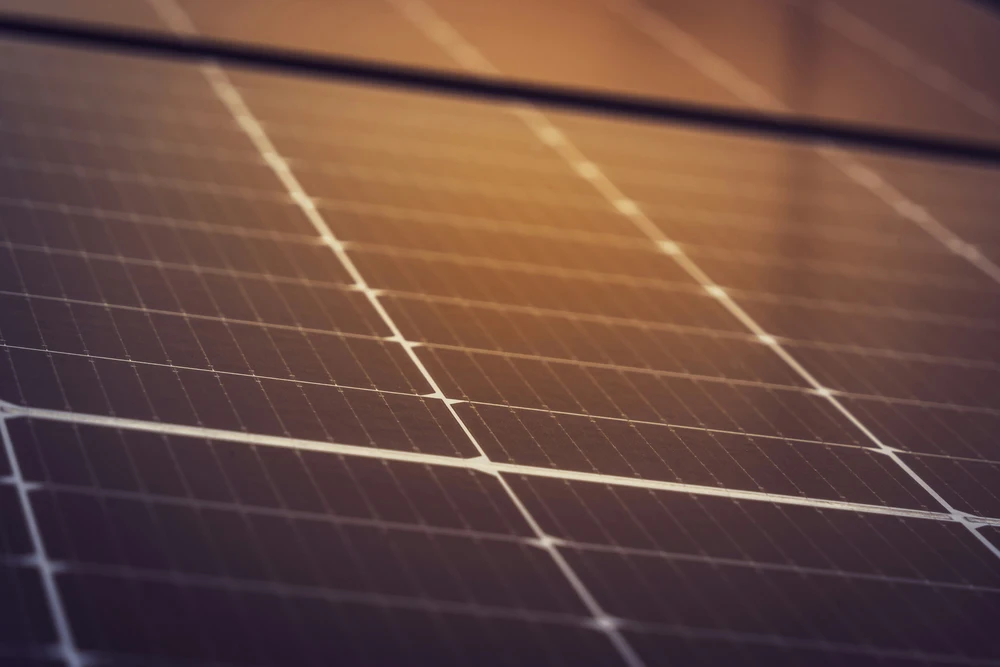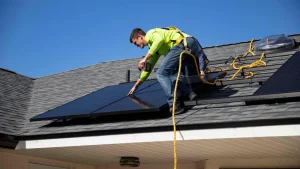Switching to solar energy is a significant decision, and it can feel overwhelming. But did you know that solar power is not just an eco-friendly choice, but also a smart life hack? It can save you money and reduce stress in the long run. This comprehensive checklist will guide you through the key factors to consider when deciding if solar power is a good fit for your home and lifestyle. Follow each step to evaluate your situation and make an informed decision about going solar.
1. Assess Your Home’s Solar Potential
Roof Condition
- Question: Is your roof in good condition?
- Details: Solar panels are a long-term investment, typically lasting 25-30 years. It’s crucial that your roof is in good shape to support them for this duration.
- Tip: If your roof needs repairs, consider fixing it before installing solar panels to avoid additional costs later.
- Action: Schedule a roof inspection to assess its condition. Ensuring your roof is ready for solar panels now can prevent stress and unexpected expenses in the future.
Roof Orientation and Tilt
- Question: Is your roof oriented towards the south, east, or west? Is the tilt angle suitable for solar panels?
- Details: The orientation and tilt of your roof significantly affect the efficiency of solar panels. South-facing roofs with a tilt angle between 15-40 degrees are ideal for capturing maximum sunlight.
- Tip: If your roof is not optimally oriented or tilted, specialized mounting systems can sometimes compensate.
- Action: Consult with a solar provider to evaluate your roof’s orientation and tilt. Getting this right can maximize your energy savings and simplify your energy management.
Shade and Obstructions
- Question: Are there trees, buildings, or other structures that cast shadows on your roof?
- Details: Shading can greatly reduce the efficiency of solar panels. Even partial shading can have a disproportionate impact on energy production.
- Tip: Consider trimming trees or relocating obstructions to minimize shading.
- Action: Conduct a shading analysis to identify and address potential issues. Minimizing shading now can lead to stress-free, efficient energy production year-round.
2. Evaluate Your Energy Consumption
Current Electricity Bills
- Question: How much do you spend on electricity each month?
- Details: Understanding your current energy costs will help determine the potential savings from solar power. Higher electricity bills often mean greater savings.
- Tip: Review your electricity bills for the past year to get an accurate picture of your energy usage and costs.
- Action: Use an online solar savings calculator to estimate potential savings. Reducing your monthly expenses can significantly lower financial stress.
Energy Usage Patterns
- Question: Do you consume more energy during the day or night?
- Details: Solar panels generate electricity during daylight hours. If you use more energy at night, you may need a battery storage system to store excess daytime energy.
- Tip: Analyze your energy usage patterns and consider if a battery storage system is necessary.
- Action: Discuss battery storage options with a solar provider to ensure continuous energy supply. Ensuring you have power when you need it can add to your peace of mind.
3. Understand Financial Incentives
Government Incentives
- Question: Are there federal, state, or local incentives available for solar installation?
- Details: Numerous incentives, including tax credits and rebates, are available to reduce the upfront cost of solar installation. These incentives can significantly impact the overall affordability of solar energy.
- Tip: Research available incentives in your area or consult with a solar provider to identify all potential savings.
- Action: Apply for federal tax credits, state rebates, and local incentives to lower your initial investment. Taking advantage of these incentives can make solar more affordable and reduce financial worries.
Financing Options
- Question: What financing options are available for solar installation?
- Details: Various financing options, such as solar loans, leases, and power purchase agreements (PPAs), can make solar energy more accessible. Each option has its benefits and considerations.
- Tip: Compare different financing options to find the best fit for your financial situation.
- Action: Consult with financial advisors or solar providers to explore your financing options. Flexible financing can make the transition to solar smoother and less stressful.
4. Analyze Long-Term Savings
Energy Savings
- Question: How much can you save on your electricity bills over the lifespan of the solar panels?
- Details: Solar panels can drastically reduce or even eliminate your electricity bills. Over 25-30 years, the savings can be substantial.
- Tip: Use a detailed solar savings calculator to estimate your potential long-term savings based on your current energy usage and local electricity rates.
- Action: Perform a cost-benefit analysis to understand your potential savings. Lowering your energy costs can free up money for other needs, reducing financial pressure.
Return on Investment (ROI)
- Question: What is the expected ROI for your solar investment?
- Details: The ROI of solar panels depends on various factors, including installation costs, energy savings, and available incentives. Typically, the payback period for solar panels is between 5-10 years.
- Tip: Calculate the payback period and total savings over the lifespan of the system to determine your ROI.
- Action: Work with a solar provider to create a customized financial projection. Knowing your ROI can help you see the long-term benefits and reduce uncertainty.
5. Consider Environmental Impact
Carbon Footprint Reduction
- Question: How much can you reduce your carbon footprint by switching to solar?
- Details: Solar energy is a clean and renewable source of power that helps reduce greenhouse gas emissions. By switching to solar, you can significantly lower your environmental impact.
- Tip: Calculate your potential reduction in carbon emissions to understand the environmental benefits.
- Action: Use online tools to estimate your carbon footprint reduction with solar energy. Contributing to a healthier planet can give you a sense of accomplishment and reduce eco-anxiety.
Sustainable Living
- Question: Are you committed to adopting a more sustainable and eco-friendly lifestyle?
- Details: Solar energy aligns with the goals of sustainable living, contributing to a healthier planet by reducing reliance on fossil fuels.
- Tip: Consider other sustainable practices in your home to complement your solar installation.
- Action: Explore additional eco-friendly home improvements that can enhance your sustainability efforts. Embracing sustainability can lead to a more fulfilling and stress-free life.
6. Plan for Installation and Maintenance
Installation Process
- Question: Are you prepared for the installation process, including potential disruptions?
- Details: The installation of solar panels involves some temporary disruptions, including noise and limited access to certain areas of your home.
- Tip: Choose a reputable solar installer to ensure a smooth and efficient installation process.
- Action: Schedule a consultation with a solar provider to discuss the installation timeline and any potential disruptions. Proper planning can minimize inconvenience and stress.
Maintenance Requirements
- Question: Are you aware of the minimal maintenance needed for solar panels?
- Details: Solar panels require very little maintenance, typically just regular cleaning and occasional inspections to ensure optimal performance.
- Tip: Many solar providers offer maintenance packages or warranties that cover regular check-ups and repairs.
- Action: Set up a maintenance schedule to keep your solar system running efficiently. Knowing your system is well-maintained can give you peace of mind.
By following this comprehensive checklist, you can determine if solar energy is right for you. Each step provides valuable insights into your home’s suitability for solar power, your financial considerations, and your long-term energy goals. Adopting solar energy is not just a green choice; it’s a smart life hack that can save you money and reduce stress in the long run. For a personalized assessment and to get started with solar, contact our solar experts today.




